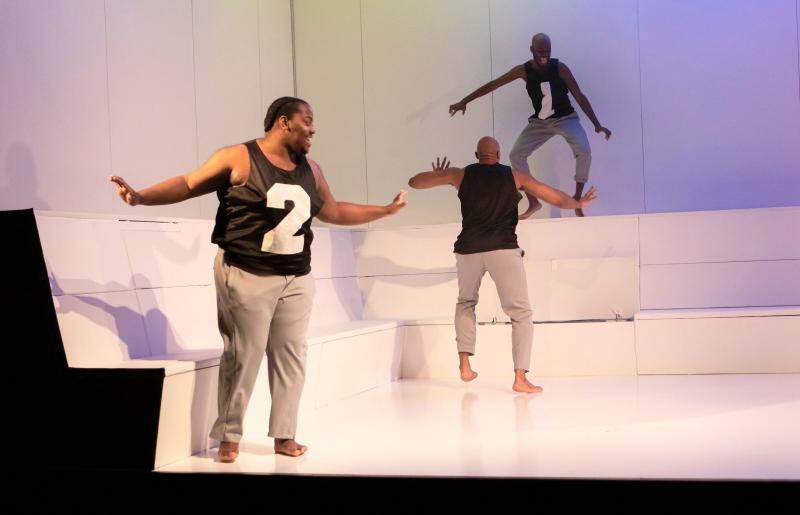Review: Donja R. Love's Absurdist Drama one in two Demands Attention For Black Gay Male HIV+ Realities
When you consider that the two best-known plays by American authors dealing with the AIDS epidemic, Larry Kramer's THE NORMAL HEART and Tony Kushner's ANGELS IN AMERICA, are both decades old and set in the 1980s, it's no wonder if playgoers tend to think of the crisis as something of the past which is now primarily under control. Even Matthew Lopez's current THE INHERITANCE, though set in the 21st Century, focuses on the loss of gay men of that preceding generation.
.jpeg)
(Photo: Monique Carboni)
Playwright Donja R. Love isn't thinking of the past with his urgently-toned absurdist drama one in two, which he began writing in 2018, prompted by a 2016 Center For Disease Control and Prevention study predicting that "one in two black gay men will be diagnosed with HIV in their lifetime."
"Absurd" is a word he uses a lot in the author's notes inserted into every program; describing the existence of such a statistic and the experiences of being both black and HIV+ in America. And while the play, as directed by Stevie Walker-Webb, does reach comically over-the-top at times, it's done so without losing its grip on the immediate threat.
There's a certain randomness to the proceedings, which is appropriate to the play's theme. Before even entering the auditorium, audience members are instructed to take a number from a dispenser. The play's excellent trio of actors, Jamyl Dobson, Leland Fowler and Edward Mawere, are lounging on designer Arnulfo Maldonado's depiction of a sterile waiting room, shirtless, as viewers enter.
Introductory dialogue between the three leads to a contest where audience applause determines who will play the central role of #1, a black gay HIV+ man named Donté. A round of rock/paper/scissors determines who will be #2 and #3, both assignments requiring them to play multiple roles, and the fellows then don numbered shirts. From here on, all three actors have memorized the entire play to cover all possibilities.

Leland Fowler (Photo: Monique Carboni)
Traditional narrative is eschewed in favor of an "amorphous, challenging and borderline non-existent ass plot," which begins with fledgling childhood awareness of sexuality that somehow morphs into a game of "So a HIV positive man walks into a bar."
Vignettes involving Donté's mom, ex-boyfriend, nurse and a sex partner play beneath an electronic tally of steadily increasing numbers.
It would be misleading to say that on the night this reviewer attended most of the audience members left before the performance was completely finished, but the playwright does present viewers with a non-traditional choice. This reviewer's advice would be to stick with it until the end to feel the full impact of what has already been an superbly played and emotionally potent theatrical experience.
Reader Reviews




